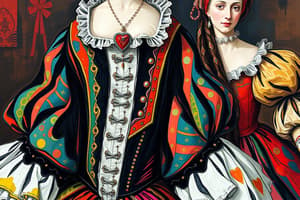Podcast
Questions and Answers
What was the primary concern of Parliament during the Elizabethan era?
What was the primary concern of Parliament during the Elizabethan era?
- Approving taxes and laws (correct)
- Managing foreign relations
- Making royal appointments
- Controlling the military
The Privy Council had no power and acted solely as an advisory body to the monarch.
The Privy Council had no power and acted solely as an advisory body to the monarch.
False (B)
Who were the powerful local officials responsible for administering law and order during the Elizabethan era?
Who were the powerful local officials responsible for administering law and order during the Elizabethan era?
Justices of the Peace (JPs)
The Crown's main source of direct income during Elizabeth's reign came from royal ______ and feudal dues.
The Crown's main source of direct income during Elizabeth's reign came from royal ______ and feudal dues.
Match the following elements of the Elizabethan Government with their functions:
Match the following elements of the Elizabethan Government with their functions:
Which statement best describes the role of Parliament in relation to royal authority?
Which statement best describes the role of Parliament in relation to royal authority?
Local government officials often pursued their own interests while serving royal authority.
Local government officials often pursued their own interests while serving royal authority.
What was the main source of revenue for the Elizabethan Crown besides customs duties and taxes?
What was the main source of revenue for the Elizabethan Crown besides customs duties and taxes?
Members of the Privy Council acted as conduits between the monarch and the ______.
Members of the Privy Council acted as conduits between the monarch and the ______.
What was one major issue faced by the royal financial administration during Elizabeth's reign?
What was one major issue faced by the royal financial administration during Elizabeth's reign?
Flashcards
Elizabethan Government
Elizabethan Government
The monarch held supreme authority, controlling everything from the judiciary to policy-making.
Parliament in Elizabethan Era
Parliament in Elizabethan Era
Parliament had limited power but played a crucial role in approving taxes and laws.
Privy Council
Privy Council
The Privy Council was the Queen's core group of advisors, responsible for daily administration, diplomacy, and law enforcement.
Justicies of the Peace
Justicies of the Peace
Signup and view all the flashcards
Royal Finances
Royal Finances
Signup and view all the flashcards
Crown Income
Crown Income
Signup and view all the flashcards
Crown Funding
Crown Funding
Signup and view all the flashcards
Royal Lands & Feudalism
Royal Lands & Feudalism
Signup and view all the flashcards
Uneven Taxation
Uneven Taxation
Signup and view all the flashcards
Local Government
Local Government
Signup and view all the flashcards
Study Notes
Elizabethan Government
- The Elizabethan era saw a highly centralized government, with the monarch at its apex.
- Queen Elizabeth I, though a powerful figure, governed through a system of councils and advisors.
- The monarch controlled all aspects of the realm, from the judiciary to policy-making.
Parliament
- Parliament held limited but significant power, primarily concerned with approving taxes and laws.
- Its role was not as prominent or assertive as it would become later.
- Parliamentary sessions were convened and adjourned at the monarch's discretion.
- Parliament's power was primarily financial; they could not challenge royal authority directly.
- MPs' motivations were often more concerned with local issues than national policy, leading to fragmented representation.
Privy Council
- The Privy Council formed the most significant body of advisors to the Queen, with varied backgrounds.
- The Privy Council handled daily administration, diplomacy, and enforcement of the law.
- Members wielded considerable power, acting as conduits between the monarch and the realm.
- The Council was responsible for all governmental activity and dealt directly with issues across the kingdom.
Local Government
- Local government operated as an extension of the royal authority.
- Justices of the Peace (JPs) were powerful local officials responsible for administering law and order.
- JPs were appointed by the monarch but represented local gentry.
- The duties of local government often overlapped with the roles of the Privy Council.
- Local officials often leveraged their positions to pursue their own aims.
Finances
- Royal finances were a crucial concern during Elizabeth's reign.
- The Crown relied heavily on customs duties and taxes to fund the government.
- Financial administration was often inefficient, with frequent problems of corruption and mismanagement.
- Elizabeth utilized loans and subsidies as supplementary funding.
- The Crown's main source of direct income came from royal lands and feudal dues.
- The burden of taxation fell unevenly, sometimes leading to public unrest.
Studying That Suits You
Use AI to generate personalized quizzes and flashcards to suit your learning preferences.




